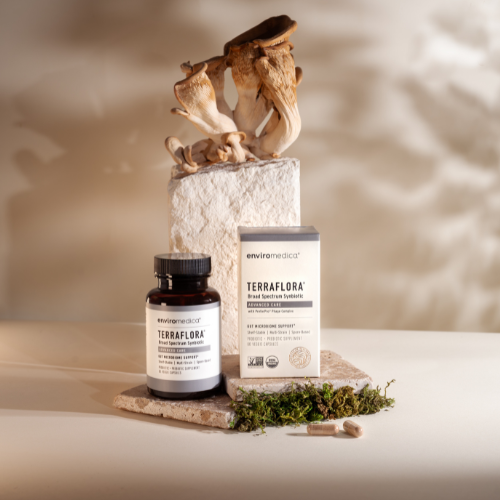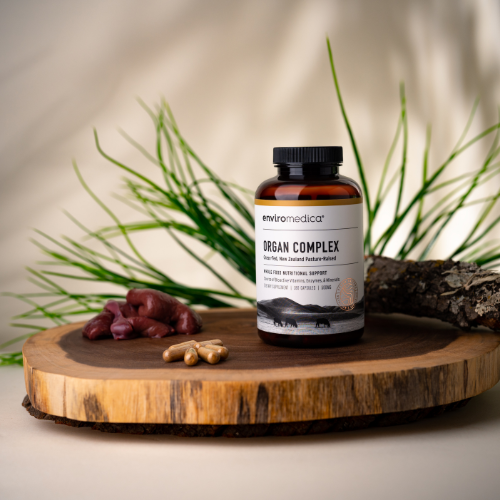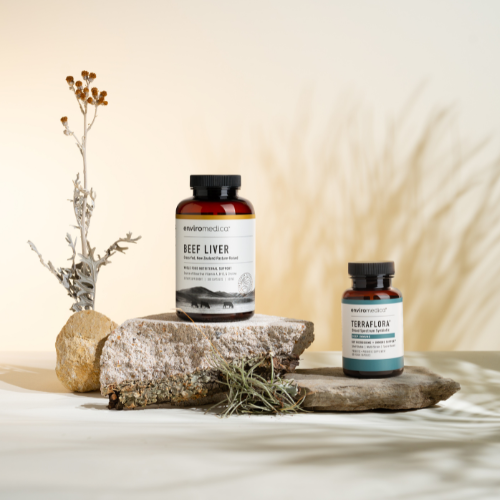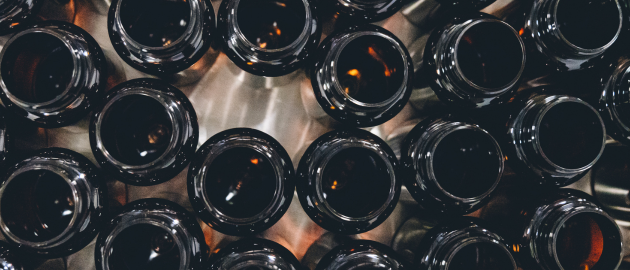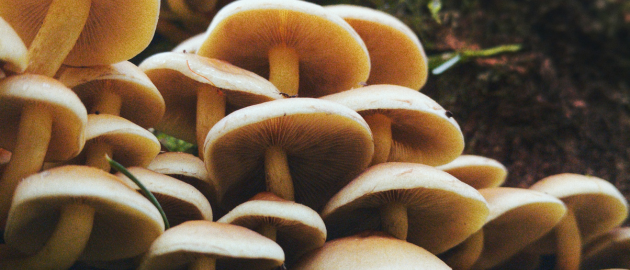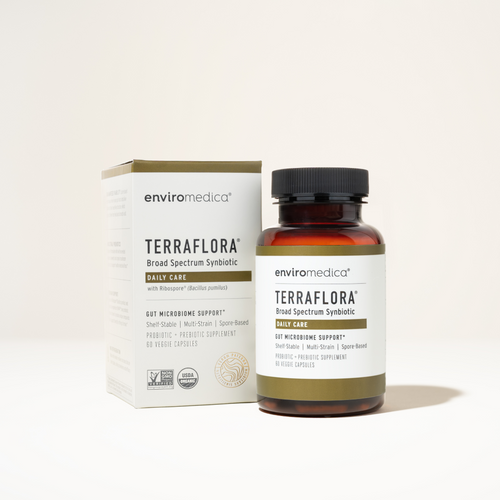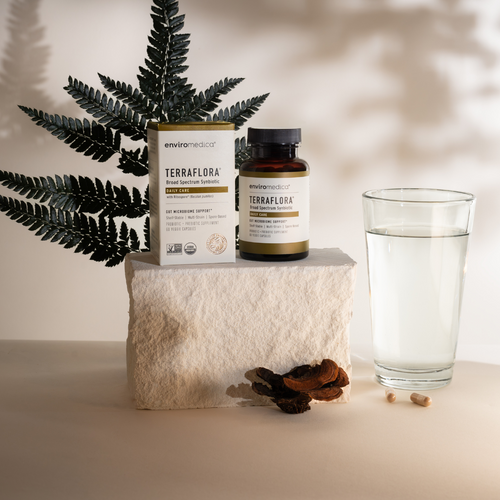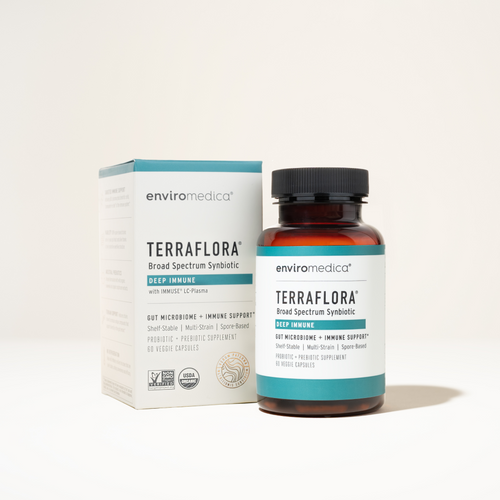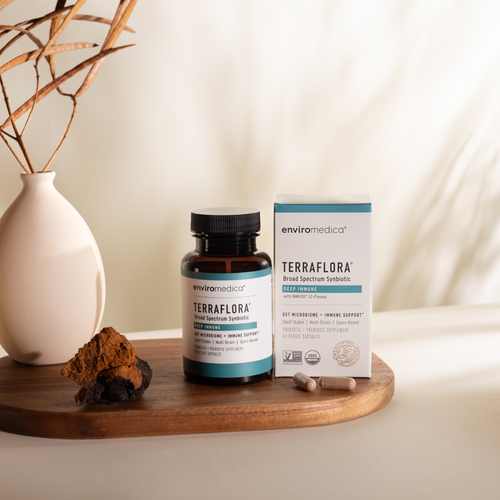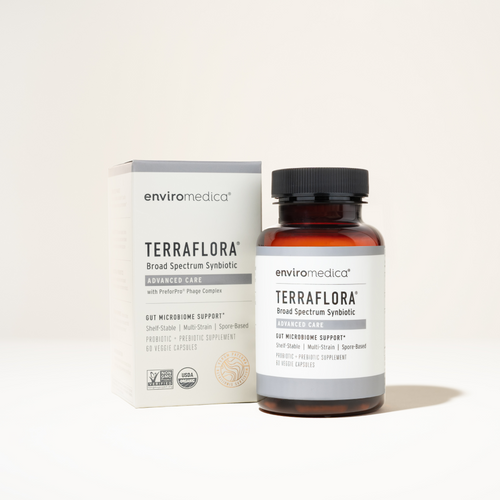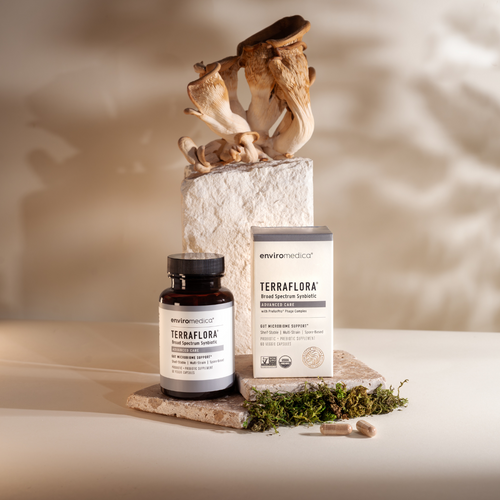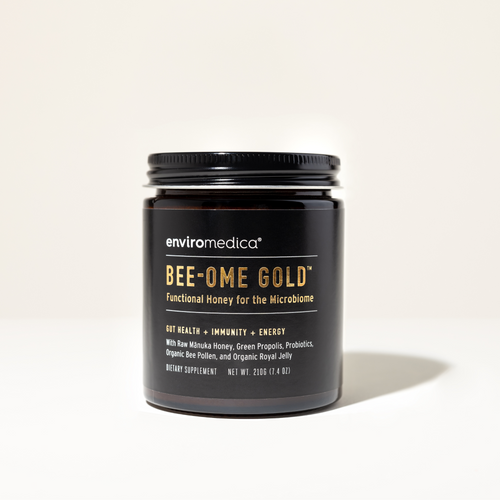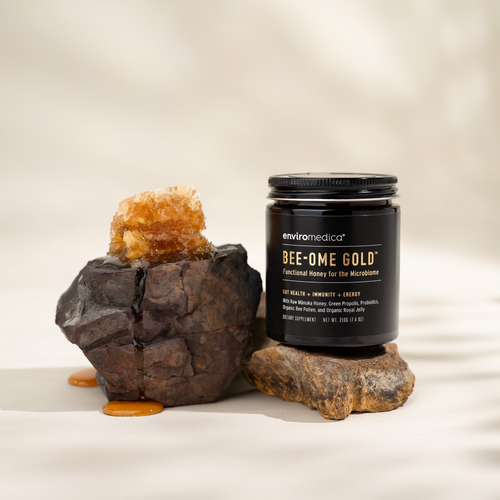Introduction: From soil to synbiotics
For most of human history, we lived in constant contact with the earth. Along with food came hardy microbes, now known as soil-based probiotics (SBOs) or spore-forming probiotics, that nourished and educated our immune systems. We ate unwashed roots, wild mushrooms, and sea vegetables, taking in both microbes and the natural fibers that fed them.
Today, modern sanitization and processed food have drastically reduced that exposure. SBOs represent a way to reconnect with the microbial diversity that our ancestors enjoyed daily and our bodies still crave.
How soil-based probiotics work in your gut
Think of them like hardy seeds. Encased in a natural shell, spore-based probiotics survive heat, stomach acid, and bile—the harsh conditions that destroy many lactic-acid probiotics. Once they reach the small intestine, they “wake up,” sprout, and interact with your native microbes.
Human studies confirm this resilience. In an ileostomy trial, Bacillus subtilis spores germinated in the small intestine within hours of ingestion, proving they don’t just pass through, they can become metabolically active in the gut.1
This echoes our evolutionary reality: for millennia, humans encountered soil organisms through food and environment. SBOs bring back a piece of that relationship, re-establishing a dialogue between humans and the microbial world we evolved alongside.
What the science shows in real people
Because SBOs survive digestion, researchers have tested them in multiple contexts. The results are promising, though strain-specific:
- Antibiotic-associated diarrhea (AAD): Bacillus clausii has been shown in multiple trials to reduce AAD risk in both children and adults, with a strong safety record.2
- Digestive comfort (IBS/dyspepsia): Certain Bacillus coagulans strains have improved bloating and abdominal pain in IBS patients, though benefits vary by strain.3
- Microbiome balance & colonization resistance: Spore-formers may help the gut resist pathogen overgrowth. For example, B. subtilis reduced Staphylococcus aureus colonization in humans without harming beneficial flora.4
The takeaway? SBOs aren’t miracle cures. Their benefits depend on the strain and context. But when you use clinically studied strains, they reliably reach the gut, germinate, and support microbial resilience in ways lactic-acid probiotics sometimes can’t.
Environmental exposure & the biodiversity hypothesis
Modern life disconnects us from the microbial diversity our ancestors knew. But science shows that reintroduction matters: in a randomized daycare trial, children who played in soil-rich environments developed greater gut and skin microbiota diversity and improved immune regulation within weeks.5
This supports the biodiversity hypothesis: our immune systems evolved in contact with diverse environmental microbes, and reduced exposure may underlie modern imbalances. SBOs are one way to reintroduce those lost inputs, alongside practices like gardening, barefoot walking, and time in biodiverse nature.
Where a synbiotic fits in by bridging ancient exposure with modern science
Our ancestors didn’t take capsules. They ate foods that paired microbes with their nourishment. Roots came with soil, mushrooms with beta-glucans, seaweeds with polysaccharides. That synergy of probiotics + prebiotics is exactly what a synbiotic is designed to deliver.
Terraflora revives that ancestral pattern with precision. Each formula combines resilient Bacillus strains (the hardy “seeds”) with wild-harvested prebiotics from mushroom fruiting bodies and seaweeds (the “soil and nourishment” they need to flourish). Together, they help rewild the gut microbiome by reintroducing the diverse microbes and natural nourishment our bodies evolved with but modern life has stripped away. Learn more about rewilding your gut →
The Terraflora synbiotic offering
- Terraflora Daily Care → Your foundational microbiome ally. A broad-spectrum synbiotic featuring Bacillus strains (including Ribospore® B. pumilus, B. megaterium EM144™, B. subtilis, B. clausii, and B. coagulans) plus wild-harvested prebiotics. Anchors your gut ecology for everyday resilience.
- Terraflora Advanced Care → Adds PreforPro® bacteriophages—nature’s “probiotic multipliers.” Supports microbial balance by selectively encouraging beneficial bacteria while crowding out overgrowth. Ideal for focused microbiome support.
- Terraflora Deep Immune → A synbiotic that pairs the Daily Care foundation with LC-Plasma (Lactococcus lactis strain Plasma), a clinically studied postbiotic shown to support immune function by priming plasmacytoid dendritic cells (pDCs)—the body’s frontline immune sentinels. Designed for those seeking additional immune resilience.
- Terraflora Deep Zen → A mind-body synbiotic that pairs the Daily Care foundation with Affron® saffron, a clinically studied extract for mood and stress balance. Connects gut and brain in harmony.
- Bee-Ome Gold → A spoonable hive-derived synbiotic featuring honey, polyphenols, and spore-formers. Complements Terraflora with a nutrient-rich, ancestral delivery format.
Each product reflects the same philosophy: ancestral inspiration, modern precision, and science-backed microbial resilience.
FAQs about soil-based probiotics (SBOs)
Are soil-based probiotics safe?
Yes, when strains are non-pathogenic and manufactured under quality standards. Frameworks like EFSA’s QPS and US FDA GRAS confirm the safety of many Bacillus strains.
What’s the difference between soil-based and spore-forming probiotics?
They’re essentially the same—“soil-based” highlights their natural origin, while “spore-forming” describes their protective biology.
Do I need prebiotics with probiotics?
Not always. But when paired correctly (as in a synbiotic), prebiotics feed both the introduced strains and your native flora, enhancing effectiveness.
What makes Terraflora different from other probiotics?
Most probiotics are fragile and require refrigeration. Terraflora uses resilient, clinically studied spore-formers combined with wild-harvested prebiotics; designed to survive, thrive, and reconnect you to ancestral microbial nutrition.
Rewilding your gut in the modern world
Our ancestors thrived on daily contact with diverse microbes from soil and wild foods. Today, we can restore that connection through spore-forming probiotics and purposefully-formulated synbiotics.
With Terraflora, you reclaim what was naturally yours; resilient microbes and ancestral nourishment, formulated for modern life.
Learn more about how Terraflora can rewild your gut.
References
- 1. Cutting SM. Generation of spores of Bacillus subtilis in the human small intestine: a potential probiotic mechanism. Frontiers in Microbiology. 2021;12:715863. doi:10.3389/fmicb.2021.715863.
- 2. Ianiro G, Tilg H, Gasbarrini A. Antibiotics as deep modulators of gut microbiota: between good and evil. Therapeutic Advances in Gastroenterology. 2018;11:1756284818777943. doi:10.1177/1756284818777943.
- 3.Majeed M, Nagabhushanam K, Fehwaz DB, Natarajan RB, Madhyastha S. Bacillus coagulans MTCC 5856 has visible impact on the gut health of IBS‐constipation individuals: a randomized, double‐blind, placebo‐controlled study. Journal of Clinical Medicine. 2023;12(2):345. doi:10.3390/jcm12020345.
- 4.Piewngam P, Zheng Y, Nguyen TH, et al. Pathogen elimination by probiotic Bacillus via signalling interference. Nature. 2018;562(7728):532–537. doi:10.1038/s41586-018-0603-2.
-
5.Roslund MI, Puhakka R, Grönroos M, et al. Biodiversity intervention enhances immune regulation and health-associated commensal microbiota among daycare children. Science Advances. 2020;6(42):eaba2578. doi:10.1126/sciadv.aba2578.
